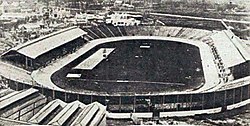Contents
| Athletics at the Games of the IV Olympiad | |
|---|---|
 Host stadium (shown in 1908) | |
| No. of events | 26 |
| Athletics at the 1908 Summer Olympics | |
|---|---|
| | |
| Track events | |
| 100 m | men |
| 200 m | men |
| 400 m | men |
| 800 m | men |
| 1500 m | men |
| 5 miles | men |
| 110 m hurdles | men |
| 400 m hurdles | men |
| 3200 m steeplechase | men |
| Medley relay | men |
| 3 mile team race | men |
| Road events | |
| Marathon | men |
| 3500 m walk | men |
| 10 mile walk | men |
| Field events | |
| Long jump | men |
| Triple jump | men |
| High jump | men |
| Pole vault | men |
| Standing long jump | men |
| Standing high jump | men |
| Shot put | men |
| Discus throw | men |
| Hammer throw | men |
| Javelin throw | men |
| Greek discus | men |
| Freestyle javelin | men |
| Tug of war | men |
At the 1908 Summer Olympics held in London, England, 26 athletics events were contested, all for men only. A total of 79 medals (27 gold, 27 silver, 25 bronze) were awarded.
Each nation was allowed to enter up to 12 competitors in most of the events. In the team races (the medley relay and the 3 mile team race), each nation entered one team. The medley relay was run by four athletes, with four alternates allowed. In the 3 mile team race, five athletes from each nation ran with only three counting.
The competition was restricted to amateurs, and was held under the rules of the British Amateur Athletic Association.